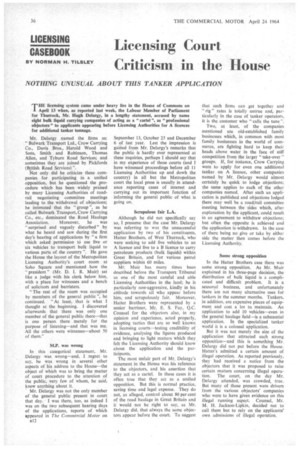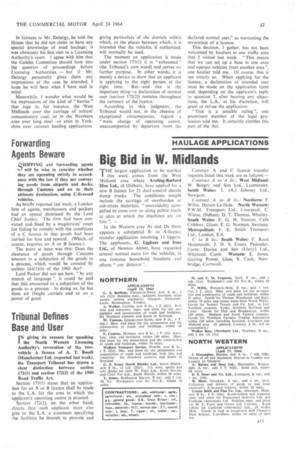Licensing Court Criticism in the House
Page 38

Page 39

If you've noticed an error in this article please click here to report it so we can fix it.
BY NORMAN H. T1LSLEY
NOTHING UNUSUAL ABOUT THIS TANKER APPLICATION
THE licensing system came under heavy fire in the House of Commons on I April 13 when, as reported last week, the Labour Member of Parliament for Thurrock, Mr. Hugh Delargy, in a lengthy statement, accused by name eight bulk liquid carrying companies of acting as a " cartel", as "professional objectors" to applicants appearing before Licensing Authorities for A licences for additional tanker tonnage.
Mr. Delargy named the firms as: "Bulwark Transport Ltd., Crow Carrying Co., Davis Bros., Harold Wood and Sons, Smith and Robinson, Thomas Allen, and Tyburn Road Services; and sometimes they are joined by Pickfords (British Road Services) ".
Not only did he criticize these companies for participating in a unified opposition, but he questioned the _procedure which has been widely praised by many Licensing Authorities of roadrail negotiating committee meetings leading to the withdrawal of objections; he intimated that the "group", as he called Bulwark Transport, Crow Carrying Co., etc., dominated the Road Haulage Association. Moreover, he was " surprised and vaguely disturbed" by what he heard and saw during the first day's hearing of applications by "a firm which asked permission to use five or six vehicles to transport bulk liquid to various parts of the country ". He gave the House the layout of the Metropolitan Licensing Authority's court room at Soho Square and mentioned how the "president" (Mr. D. I. R. Muir) sat like a judge with his clerk below him, With a place for witnesses and a bench of solicitors and barristers.
"The rest of the room was occupied by members of the general public ", he continued. "At least. that is what I thought at the beginning. I discovered afterwards that there was only one member of the general public there—that is one person there merely for the purpose of listening—and that was me. All the others were witnesses—about 50 of them."
M.P. was wrong In this categorical statement, Mr. Delargy was wrong—and, I regret to say, he was wrong in several other aspects of his address to the House—the object of which was to bring the matter of court procedure to the attention of the public, very few of whom, he said, knew anything about it.
• Mr. Delargy was not the only member of the general public present in court that day. I was there, too, as indeed I was on the two subsequent hearing days of the applications, reports of which appeared in The Commercial Motor on B12 September 13, October 25 and December 6 of last year. Lest the impression is gained from Mr. Delargy's remarks that the public is hardly ever represented at these inquiries, perhaps I should say that in my experience of these courts (and I have witnessed proceedings before all Ii Licensing Authorities up and dowb the country) in all but the Metropolitan court the local press is usually in attendance reporting cases of interest and carrying out its important function of informing the general public of what is going on.
Scrupulous fair L.A.
Although he did not specifically say so, I presume that the case Mr. Delargy was referring to was the unsuccessful application by two of his constituents, Hatter Brothers, of West Thurrock, who were seeking to add five vehicles to an A licence and five to a B licence to carry petroleum products (bulk liquids) within Great Britain, and for various petrol suppliers within 60 miles.
Mr. Muir has many times been described before the Transport Tribunal as one of the most careful and able Licensing Authorities in the land; he is particularly non-aggressive, kindly in his attitude towards all who appear before him, and scrupulously fair. Moreover, Hatter Brothers were represented by a senior barrister, Mr. E. S. Fay, Q.C. Counsel for the objectors also, in my opinion and experience, acted properly, adopting tactics that are so well known in licensing courts—testing credibility of evidence, analysing the figures produced and bringing to light matters which they felt the Licensing Authority should know about the application and the participants.
The most unfair part of Mr. Delargy's statement in the House was his reference to the objectors, and his assertion that they act as a cartel. In these cases it is often true that they act as a unified opposition. But this is normal practice, saving time and legal expense. They do not, as alleged, control about 80 per cent of the road haulage in Great Britain and it would not be right to say, as Mr. Delargy did, that always the same objectors appear before the court. To suggest that such firms can get together and " rig" rates is totally untrue and, particularly in the case of tanker operators, it is the customer who "calls the tune ".
Two, at least, of the companies mentioned are old-established family businesses which, in common with most family businesses in the world of commerce, are fighting hard to keep their heads above water in the face of stiff competition from the larger " take-over " groups. If, for instance, Crow Carrying were to apply for even one additional tanker on A licence, other companies named by Mr. Delargy would almost certainly be quick to lodge objections; the same applies to each of the other companies named. After such an application is published and objections lodged there may well be a road/rail committee meeting between the sides which, after explanation by the applicant, could result in an agreement to withdraw objections; but often the opposite is achieved and the application is withdrawn. In the case of there being no give or take by either side the matter then comes before the Licensing Authority.
Some strong opposition In the Hatter Brothers case there was some strong opposition. As Mr. Muir explained in his three-page decision, the distribution of bulk liquid is a complicated and difficult problem. It is a seasonal business, and unfortunately there are not many alternative uses for tankers in the summer months. Tankers, in addition, are expensive pieces of equipment and cost a lot ta maintain. An application to add 10 vehicles—even in the general haulage field—is a substantial application. In the specialized tanker world it is a colossal application.
But it was not merely the size of the application that attracted such strong opposition—and this is something Mr. Delargy did not put before the House. Hatter's admitted a certain amount of illegal operation. As reported previously, they had received a notice from the objectors that it was proposed to raise certain matters concerning illegal operation. The court, on the day Mr. Delargy attended, was crowded, •true. But many of those present were drivers from the various objectors' companies who were to have given evidence on this illegal running aspect. Counsel, Mr. M. H. Jackson-Lipkin, decided not to call them but to rely on the applicants' own admissions of illegal operation. In fairness to Mr. Delargy, he told the House that he did not claim to have any special knowledge of road haulage; it was obviously his first visit to a Licensing Authority's court. I agree with him that the Geddes Committee should look into the question of proceedings before Licensing Authorities — but if Mr. Delargy personally gives them any impressions of the case he attended, I hope he will bear what I have said in mind.
Meanwhile, 1 wonder what would be his impressions of the kind of " battles " that rage in, for instance, the West Midlands over the carriage of miners' concessionary coal, or in the Northern area over long steel—or even in Yorkshire over caravan hauling applications. giving particulars of the districts within which, or the places between which, it is intended that the vehicles, if authorized, will normally be used.
The moment an application is made under section 171(1) it is "exhausted" (the Tribunal's own word) and serves no further purpose. in other words, it is merely a device Co show that an applicant is applying to the right person at the right time. But—and this is the important thing—a declaration of normal user (section 172(2)) remains throughout the currency of the licence.
According to this judgment, the Tribunal would not, in the absence of exceptional circumstances, regard a "mere change of operating centre, unaccompanied by departure from the declared normal user," as warranting the revocation of a licence.
This decision, I gather, has not been welcomed by hauliers in one traffic area that I visited last week. "This means that we can set up a base in one area and operate vehicles from another area ". one haulier told me. Of course, this is not strictly so. When applying for the licence, a declaration of intended user must be made on the application form and, depending on the applicant's reply to question 7, after hearing any objections, the L.A., at his discretion, will grant or refuse the application.
"This is a sensible ruling ", one prominent member of the legal profession told me. It certainly clarifies this part of the Act.




















































































































